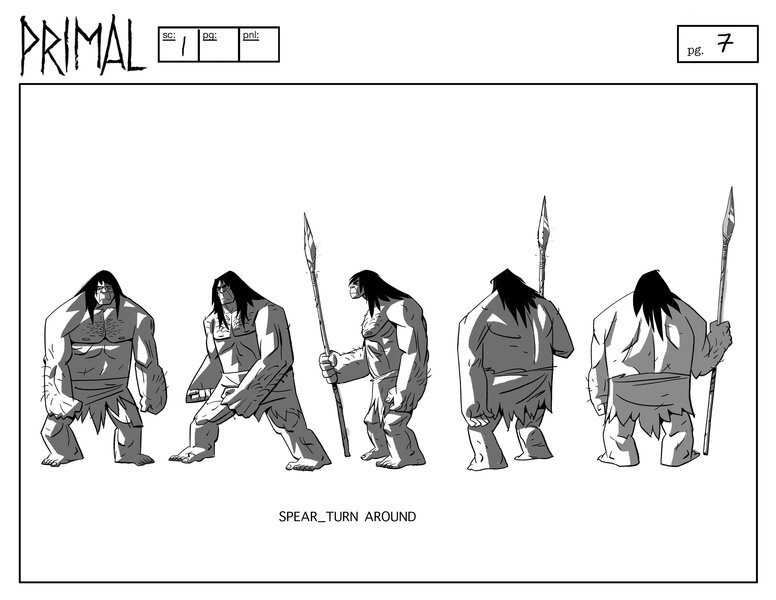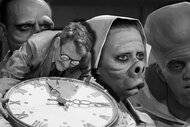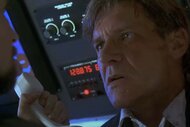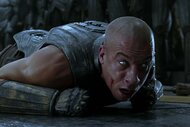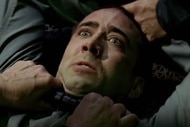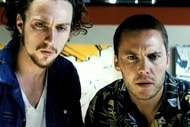Create a free profile to get unlimited access to exclusive videos, sweepstakes, and more!
After two 'Primal' Emmy wins, Genndy Tartakovsky says Season 2 is 'his best work'
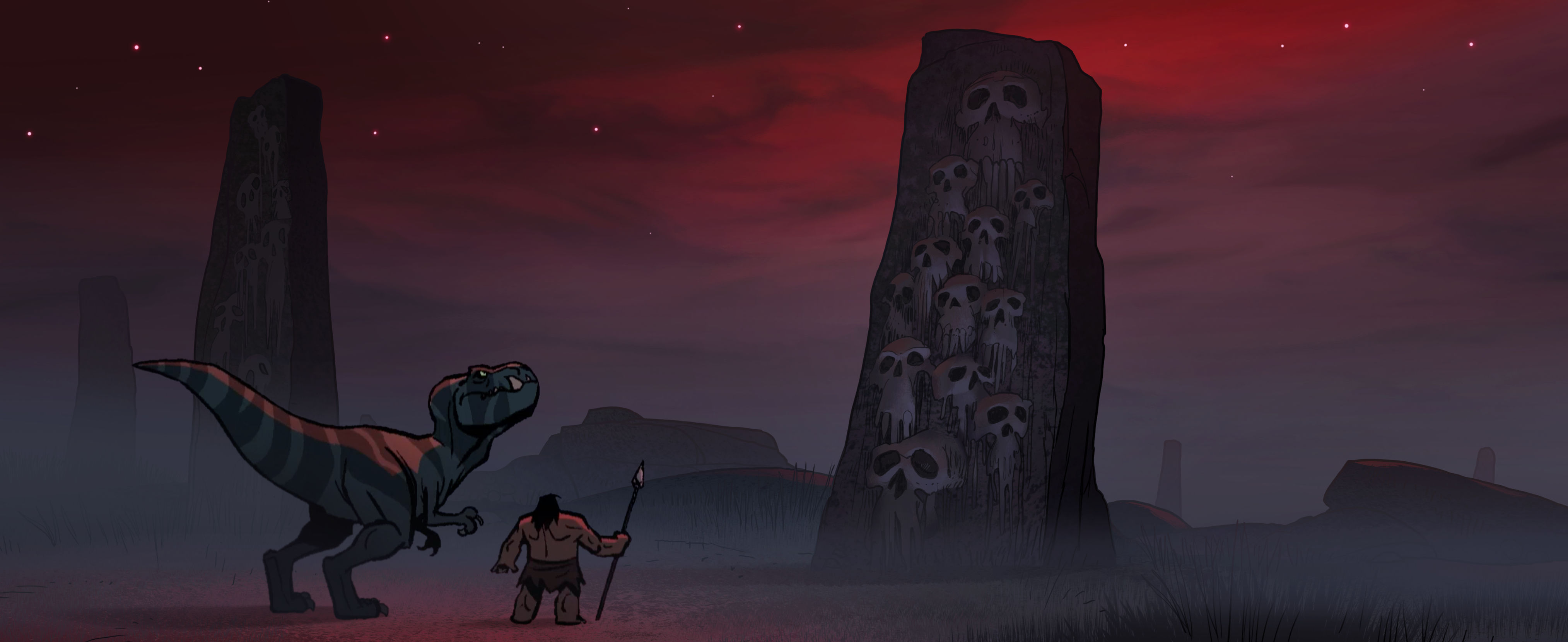
Primal is a silent, crazy-violent animated series about a prehistoric man and his dinosaur, and at the 2021 Creative Arts Emmy Awards this weekend, Genndy Tartakovsky added one more descriptor to his latest show: Primal is now an award-winning, silent, crazy-violent animated series about a prehistoric man and his dinosaur.
The second half of Tartakovsky’s Adult Swim series, Primal, won a 2021 juried Outstanding Individual Achievement in Animation for storyboard artist David Krentz and Best Animated Program for the episode “Plague of Madness.” As the most minimalist (yet high-concept) series Tartakovsky has ever brought to life, Primal is proving that 2D animation isn’t dead and that an adult audience will show up for something outside the industry norms.
Picking up where we left off in discussing Primal Season 1, SYFY WIRE spoke with the director over Zoom to breakdown the last four episodes of the season, get some intel on Primal’s second season, and learn the status of his upcoming Cartoon Network/HBO Max animated series, Unicorn: Warriors Eternal.
In a first season full of impressive episodes, what about “Plague of Madness” stood out for you as the standout effort?
It's one of the simpler ones, but it had this gravitas at the end of it that brought everything together. I was really excited about it because you have the audience in a zombie chase cartoon, and then you add this unnecessary death and these things that are more sophisticated, all without dialogue. I didn't have to say it with words, and that was the most exciting. Whenever we do something in Primal that is more complex and thought-provoking, I feel we've succeeded on a whole different level. And so even though I always love the "Coven of the Damned" episode, which is really about grief and loss, the “Plague of Madness” one just really struck a chord.
Speaking of “Coven of the Damned,” it’s the first time you really introduce magic into the mythology. Was that its primary purpose concept-wise?
No, the initial idea was prehistoric witches and that's a home run right there. What does that look like? And then developing it so it's more than just fighting some bad witches. One of the key elements of storytelling for Primal is, you don't know what's bad or what's good, which is nature, right? With these witches, we want to establish that they're bad because they're stealing souls and making babies and stuff. But then you want to make them sincere, and we want to have empathy for them. Whenever somebody talks to me about that episode, and they describe it to me so eloquently and poetically, I love it because it was really hard to do and you want to trust the audience to make that connection. Like, it's glaring when we talk about it, but when you watch it, are people gonna put two and two together? It was such a successful experiment because we've got a little bit of action, we've got this intensity and mystery, and then it ends with this heartbreak.
"The Night Feeder" is the prehistoric Evil Dead episode. Was it inspired by Raimi's film?
Yeah, it was about that old theory of "if you don't see it, it's scarier" which is back from the ‘50s. Army of the Dead and Evil Dead, yes, I'm a big Sam Raimi fan so that's definitely an inspiration. It's like the same story, but it broke the mold a little bit because we're doing it from a different point of view, and trusting sound to do a lot of it.
You teased to us that the season finale, "Slave of the Scorpion," would be a game-changer for the series and it is. Was this always where the story was leading?
Initially, it was one of the early episodes because I thought I wouldn't have enough stories and I didn't want [the series] to be "monster of the week." But then, as we started to write the stories, I realized there's so much more we can do. We've got this idea and this idea. Whenever you come up with a show and ideas flow quickly, that means you've got something good. I think these first 10 ideas came so easily because I haven't done stuff like this. My mind was rife with apes who drink this elixir, and they get crazy jacked up. [Laughs.] By the 10th episode, I'm like, '"Right, now it's time." Once we did "Coven," I knew that this was the epitome of the complex storytelling. And now let's double down on the story, and have the story evolve into the next chapter.
Did you always plan to reveal Spear’s language skills in this episode?
I think it was in the story, just her name: Mira. We spent the whole 10 episodes, where he's just grunting and yelling. And now, he's not responding to her. But in actuality, he's processing it all. Then he finally says it and I thought it was such a nice, poetic end to the first chapter.
Should we be thinking Mira is from some kind of Lost World?
We try to be science-accurate because it makes it more real. But obviously, with a man and dinosaur, you're already breaking that. And I'm setting you up for the rules. Now we know there's magic. We know she's from some kind of [place] with language. There's bows and arrows. There's a boat. The audience should make up their own minds about where they think we're going to go. If you're watching, you're [thinking] there's something bigger in this world. It's not a Lost World. I don't think of it that way.
Is audience speculation on target?
I'm not giving anything away, but in history and in reading science and stories, there's factual evidence that man at different evolutions lived together. In some caves in Europe, they found Neanderthal skeletons and Homo Sapiens. It was fascinating. And so the idea that Vikings came upon the Wendigo, and that was some kind of form of Neanderthal man, was amazing. And I think this is that world. It's not a Lost World, but it evolves at different times.
What should we expect for Season 2?
The biggest challenge of the second season was not to be cliche. When you're entering this genre, it's easy to go to what's been done. And initially, we went there and I hated it because it was the first pass and it was too easy. And it was wrong. I broke it all down and then we completely reimagined the second season. And because the storytelling was successful in the first season, I now decided to be more experimental. I don't want to say avant-garde, but it's slightly different in the way we're telling the stories. It still feels like Primal, but it definitely is the next step. When you're watching the first 10 episodes, I think there's an evolution of character and that definitely continues. I'm super excited about it. It's the best work I think I've done storytelling-wise because it's different. It's going to be a different experience amped up from the first season.
You are all kinds of busy with a variety of live-action and animation projects. Were you able to keep the same team on Season 2 with Bryan Andrews directing Marvel Studioss' What If…?
I traded Bryan for his brother Mark. [Laughs.] Mark did one episode and then Dave Krentz did the other two, and then I did the rest of them. This type of storytelling is just hard. It's hard and it's demanding in what I want from it. It's too fun for me not to do it, in a way, and I'm a control freak in another way. There's a certain tone and a certain style that Primal is, and so I did it. And I really love the Japanese model where the director does all the episodes with the boards. I really believe in that. I tried it the other way where we had big teams on Dexter and Samurai. That brought other good things, but this is super personal, this style, to me, I just ended up doing it.
Where are you with Primal Season 2 and the Cartoon Network/HBO Max animated series, Unicorn: Warriors Eternal?
Primal and Unicorn are equally there. They ended up, somehow, in the same time frame for production. Right now, I'm boarding the last episode of Primal and I'm boarding the last episode of Unicorn. How did I get into this? Unicorn was a show that I came up with over 15 years ago so getting to make it is incredible. But they're right on top of each other. It's a nightmare and at the same time, it is so creatively satisfying. If you analyze it from the outside, I have two of my own original creations. They're both completely different. I'm supervising both of them. I'm boarding 70 percent of both of them. I don't know how I'm doing it. I'm completely underwater right now. But then little by little, I get it done.
We have the first episode finished for Unicorn and it's super unique, super different with a totally different tone. I'm super excited about it. The people who have seen it have great reactions. And we have three finished episodes of Primal and they're awesome. It's crazy busy. But no complaints. I love it.
